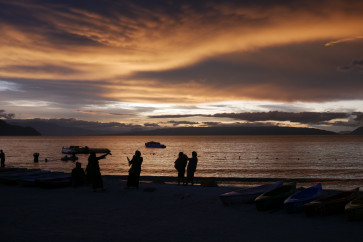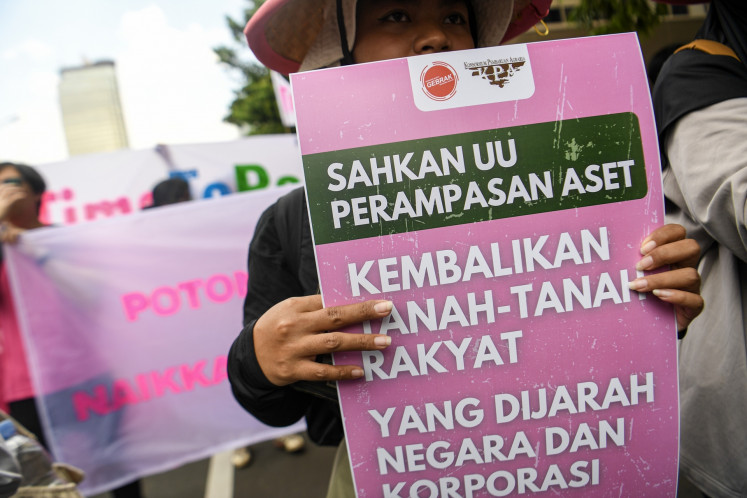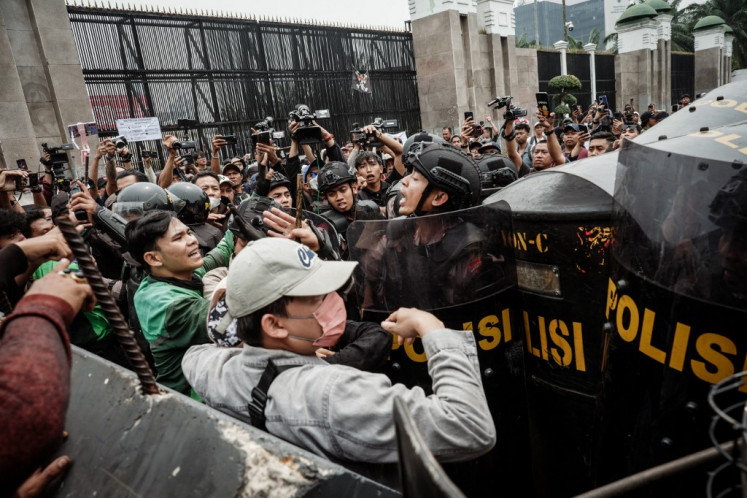Popular Reads
Top Results
Can't find what you're looking for?
View all search resultsPopular Reads
Top Results
Can't find what you're looking for?
View all search resultsMegawati’s choice and the ‘old wine in old bottles’ phenomenon
When talking to Megawati Soekarnoputri’s closest advisors and friends about what is on her mind these days, it becomes clear that she is still undecided about whether or not to contest the 2014 presidential election
Change text size
Gift Premium Articles
to Anyone
W
hen talking to Megawati Soekarnoputri’s closest advisors and friends about what is on her mind these days, it becomes clear that she is still undecided about whether or not to contest the 2014 presidential election.
Being the chairwoman of the Indonesian Democratic Party of Struggle (PDI-P), one of the country’s largest political parties, a position which also holds an indisputable veto on the party’s nomination of a presidential candidate, her decision on whether to take up the challenge or anoint a new figure is one of the big remaining questions hanging over the 2014 race.
Megawati has good reason to be somewhat hesitant.
Unlike Aburizal Bakrie of the Golkar Party and Prabowo Subianto of the Great Indonesia Movement (Gerindra) Party, who are trying “their luck” in the upcoming election, Megawati has already been president. She is probably aware that, by most accounts, her three-year stint in the palace, which started in 2001, did not receive high grades.
Losing her bid to recapture power in the 2004 election and failing again in 2009 seemed to vindicate the charges of her critics that she was a spent force in Indonesian politics.
To run for a fourth time and then lose again would not only be a huge loss of face for Megawati. It would mean that her party would be left out in the cold for another long spell and, as a consequence, would risk Indonesians reaching the conclusion that the PDI-P was little more than a party of the past.
This is hardly the type of legacy Megawati wants to leave behind.
Still, it is early days and a long stretch before Indonesians vote for their next president, and while Megawati might not carry the allure she once did, it would be a huge miscalculation to dismiss her as not being a power to be reckoned with.
Her name is synonymous with the PDI-P, which is identified in the public consciousness as being the torchbearer of the highly-respected Sukarno name and — in the minds of a large number of die-hard Soeharto loyalists across Java — a political dynasty that is comparable to the Gandhi’s of India or the Kennedy’s in the US.
Much like Gandhi leading his people against British-ruled India, Sukarno was the preeminent leader of Indonesian nationalism and independence against his country’s Dutch colonial masters.
And very much like John F. Kennedy, Sukarno brought a certain flair, style and machismo to the palace and won the admiration of many Indonesians.
Although his “glory years” in office might be slightly romanticized in the history books, one can discern a yearning in the hinterlands for a similar figure to reemerge and lead Indonesia into the future.
The question is: Can the PDI-P manage to leverage its valuable brand and therefore rise to power once again?
The potential is certainly there. Besides owning the Sukarno pedigree, there are other factors, which suggest the PDI-P could be sitting in a very advantageous position in the run-up to 2014. One key advantage comes from the fact that, without exception, the PDI-P’s main competitors are suffering from scandals and poor reputations.
In short, the party could be perceived as virtuous by disassociation. As Megawati’s PDI-P is the only major party that didn’t join Yudhoyono’s ruling coalition, this has placed her in a position of moral superiority at a time when it has become all too apparent to Indonesians that the incumbent administration is rotten to the core.
The PDI-P’s second, and most powerful, advantage lies in the fact its competition is unable to think imaginatively about presidential tickets. None of the major parties are trying to conduct serious internal debates and search for candidates that will truly appeal to broad swathes of the electorate.
In the words of one veteran political operator, “Our political parties are putting old wine in old bottles. The popularity of politicians, such as Joko Widodo [Surakarta mayor and governor-elect of Jakarta], should be a good lesson for everybody — that voters get excited when they see a new and credible candidate. The bosses of the big parties, however, are intent on recycling old, worn-out candidates that nobody really likes.”
Fortunately for Megawati, she has the luxury of controlling her party and not having to deal with the intensity of cronyism and the type of insular mindsets that afflict her competitors. She doesn’t really need to become president again, and it would not be surprising to learn that she doesn’t want it.
In the final analysis, that brings us back to the question of the 2014 election. For the moment, it is true that the majority of Indonesians feel distraught when they see the current cast of presidential hopefuls being touted by political parties. Nobody seems excited, and for good reason.
Old wine in old bottles is not a formula for energizing voters. But, one could easily imagine what would happen if one of the major political parties, such as Megawati’s PDI-P, decided to break ranks and announce a new candidate that was not tainted by the past or money politics, and thus offer real hope of change.
Given the internal dynamics of their parties and shortsightedness, it is highly unlikely that Golkar or the Democratic Party will be able to change their ways. But for the PDI-P, there is a chance that
Megawati will have a clearer vision and understanding of what it will take for her party to win.
If she does, and if she takes a leap in bringing a bright new leader on board with her endorsement, the PDI-P could finally prove itself to be the party of the future.
The writer is alumnus of the University of Hawaii at Manoa and a lecturer at the Syarif Hidayatullah State Islamic University,Jakarta.










